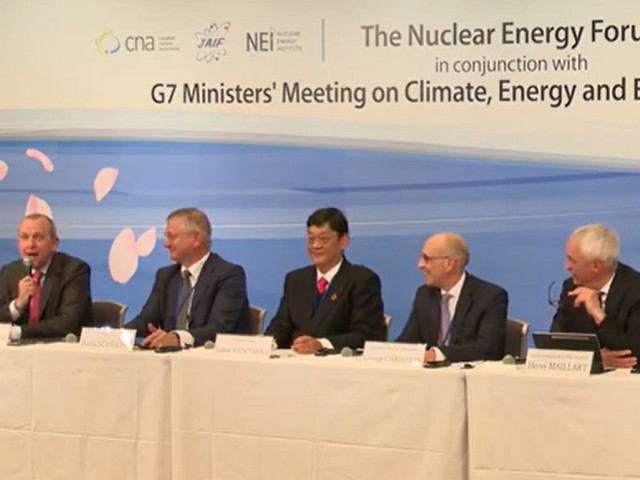
A nuclear power alliance between the UK, US, Canada, Japan and France has been formed at the G7 Ministers’ Meeting on Climate, Energy and Environment in Sapporo, Japan, as Germany brings its nuclear activities to an end in the same weekend.
A joint declaration was issued at the ministerial meeting held in conjunction with the G7 Summit calling on G7 governments to support the long-term operation of existing nuclear power plants and to accelerate the deployment of new nuclear power plants.
The declaration was signed by World Nuclear Association Director General Dr Sama Bilbao y León, alongside leaders of five other nuclear trade associations – Canadian Nuclear Association, Japan Atomic Industrial Forum, nucleareurope, Nuclear Energy Institute (US), and Nuclear Industry Association (UK).
The alliance will see the five nations build on and leverage their civil nuclear power resources to undermine Russia’s grip on nuclear supply chains. Furthermore, the agreement will support the stable supply of fuels for current requirements, as well as for the deployment of fuels for future advanced reactors.
While these G7 countries are turning to nuclear as a way to boost energy security, it seems Germany, who is also a member of the G7, is not reading off the same hymn sheet.
The announcement follows on the heels of Germany closing its remaining three nuclear power plants, a decision that has received a great deal of backlash from the sector.
Not only will Germany’s shift from nuclear cause an increase in the use of coal-fired power, even if it is in the short-term as suggested in the below tweet from data analysts EnAppsys, but it will also have a knock-on effect on consumers in neighbouring countries.
Martien Visser, a lecturer in Energy Transition at Hanze University Groningen, was reported as saying that Germany’s decision would certainly have an impact beyond its borders.
“After all, the power grids in Northwest Europe are interconnected,” explained Visser to the Dutch news website RTL. This is useful because a power shortage in one country can be compensated for by other countries.
Visser also highlighted that gas-fired power is more expensive than nuclear and more gas will be needed as nuclear has been phased out.
When it comes to public opinion and the opinion of politicians, Germans are clearly split.
Ricarda Lang, head of the climate-friendly Greens’ parliamentary group, was reported to have written on Twitter that the end of nuclear power “marks a definitive entry into the age of renewable energies” that would allow the current generations to “ultimately leave to our children with a clear conscience.”
The Free Democratic Party (FDP) parliamentary group, expressed dissatisfaction with the exit.
Party leader Christian Lindner, Germany’s finance minister, wrote on Twitter: “The future is renewable energy, but in the meantime, we have to secure our supply until we have sufficient capacity. If it was up to me, we would keep existing nuclear power plants in reserve & prevent their dismantling. CL #Atomausstieg.”
The German business community has also made its position clear, reportedly expressing concerns over increased electricity prices and the resulting impact on production costs.